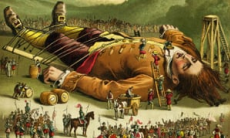
Email: reecejordan98@hotmail.co.uk
Total Article : 168
About Me:18-year-old sixth form student, studying English Literature, History and Government and Politics. My articles will broadly cover topics from the current affairs of politics to reviews of books and albums, as well as adding my own creative pieces, whether it be short fiction or general opinion.

If you’re anything like me, your first inkling of Gulliver’s Travels comes from the saccharine Disney Pixar diet of childhood; perhaps Jack Black with his ever-fat rockstar face springs to mind, or you may just think of the black and white terms of ‘isn’t that the big fella with the small people?’ Either way, it is clear that Jonathan Swift’s satirical masterpiece has been distilled down for modern society. I must say, despite it being a laudable thing for the novel to have such longevity, this distortion of its main elements only serves as a detriment to what is otherwise a hilarious and brilliant piece of fiction.
I say this because the part that everyone is familiar with – namely Part 1, Gulliver’s trip to Lilliput – does not make up the novel’s entirety. Indeed, it is still a brilliant part of the book; seeing Gulliver coming to terms with this newfound behemoth state and yet still try to maintain some semblance of decorum is well worth the read. But to read this in isolation is to completely miss the crux of the novel. Jonathan Swift begins his pseudo-travel narrative with this part as it fits into the notion that was beginning to become prevalent in the early 18th century – the hubris of humanity.
This is brilliantly juxtaposed with its contrast – Part 2 – Gulliver’s trip to Brobdingnag, where he suddenly finds himself shrunken to the same proportions of the Lilliputians, around whom he felt almost godlike. Now he’s insignificant, a mere plaything, something that is tended to by a child as if he were a pet. He is terrorised by flies, he starts a feud with a dwarf, and is almost killed by a monkey. But with his tiny size he adopts a new sense of perspective. Where the Lilliputians were so small so as to not be seen in any much detail, here the Brobdingnaggians are magnified, and all their defects are on full show to Gulliver. In one such moment, the ‘fairest ladies of the land’ take Gulliver with them to the women’s changing room where they use him as a toy of sorts, allowing him to see them undressed and even alighting him on their breasts. In effect, they allow Gulliver the liberties which would have been the envy of the men throughout Brobdingnag. However, rather than glowing with admiration, Gulliver cannot help but be filled with revulsion. He sees all the scaliness of their skin, their seemingly insignificant growths he sees as the oncoming of cancerous tumors. By juxtaposing these two parts, Swift reminds us to be wary of bathing in our hubris, that if we are to take an approach of humility and really look at ourselves, we will see flaws.
Thus, the view of Gulliver’s Travels as merely his travels with Lilliput, whilst providing a decent comedic perspective is a reductive view of the novel. It’s time to reclaim its entirety.
Image Credits: theguardian.com

0 Comment:
Be the first one to comment on this article.